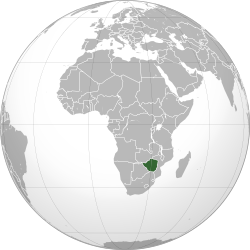Rhodesian
| Rhodesia | ||||||||||
| Unrecognised state | ||||||||||
|
||||||||||
|
||||||||||
|
Motto Sit Nomine Digna (Latin) "May she be worthy of the name" |
||||||||||
|
Anthem "Rise, O Voices of Rhodesia" (1974–1979) Royal anthem "God Save the Queen" (1965–1970) |
||||||||||
| Capital | Salisbury | |||||||||
| Languages |
English (official) Afrikaans, Shona and Ndebele widely spoken |
|||||||||
| Government | Constitutional monarchy (1965–70) Parliamentary republic (1970–79) |
|||||||||
| Head of State | ||||||||||
| • |
Monarch 1965–1970 |
Elizabeth II (Unrecognised by Elizabeth II) |
||||||||
| • |
President 1970–1975 |
Clifford Dupont (First) |
||||||||
| • | 1979 | Henry Everard (Acting president) (Last) | ||||||||
| Prime Minister | ||||||||||
| • | 1965–1979 | Ian Smith | ||||||||
| Legislature | Parliament | |||||||||
| • | Upper house | Senate | ||||||||
| • | Lower house | House of Assembly | ||||||||
| Historical era | Cold War | |||||||||
| • | Independence (UDI) | 11 November 1965 | ||||||||
| • | Republic declared | 2 March 1970 | ||||||||
| • | Zimbabwe Rhodesia | 1 June 1979 | ||||||||
| • | Zimbabwe | 18 April 1980 | ||||||||
| Area | ||||||||||
| • | 1978 | 390,580 km² (150,804 sq mi) | ||||||||
| Population | ||||||||||
| • | 1978 est. | 6,930,000 | ||||||||
| Density | 17.7 /km² (46 /sq mi) | |||||||||
| Currency | Rhodesian pound (1965–1970) Rhodesian dollar (1970–1979) |
|||||||||
|
||||||||||
| a. The government recognised Queen Elizabeth II as the official Head of State from 1965 to 1970. The highest official of Rhodesia held the title "Officer Administering the Government" (OAtG) as he acted in lieu of the official Governor, who remained at his post but was ignored. After Rhodesia became a republic in March 1970, the President replaced the OAtG as the highest official and the Governor returned to London. | ||||||||||
Rhodesia (/roʊˈdiːʒə/), commonly known from 1970 onwards as the Republic of Rhodesia, was an unrecognised state in southern Africa from 1965 to 1979, equivalent in territorial terms to modern Zimbabwe. With its capital in Salisbury (now Harare), Rhodesia was considered a de facto successor state to the former British colony of Southern Rhodesia (which had achieved responsible government in 1923).
During an effort to delay an immediate transition to black majority rule, Rhodesia's predominantly white government issued its own Unilateral Declaration of Independence (UDI) from the United Kingdom on 11 November 1965. The UDI administration initially sought recognition as an autonomous realm within the Commonwealth of Nations, but reconstituted itself as a republic in 1970.
Following a brutal guerrilla war fought with two African nationalist organisations (Robert Mugabe's ZANU and Joshua Nkomo's ZAPU), Rhodesian premier Ian Smith conceded to bi-racial democracy in 1978. However, a provisional government subsequently headed by Smith and his moderate colleague Abel Muzorewa failed in appeasing international critics or halting the bloodshed. By December 1979, Muzorewa had replaced Smith as Prime Minister and secured an agreement with the militant nationalists, allowing Rhodesia to briefly revert to colonial status pending elections under a universal franchise. It finally achieved internationally recognised independence in April 1980; the nation was concurrently renamed the Republic of Zimbabwe.
...
Wikipedia



